Scheduled to be operational in 2015, this offshore network will help to avoid more than three million tons of carbon dioxide emissions per year by replacing fossil-fuel based generation. http://www.abb.com/cawp/seitp202/73b24f512a7591cac12578e0001a63c8.aspx
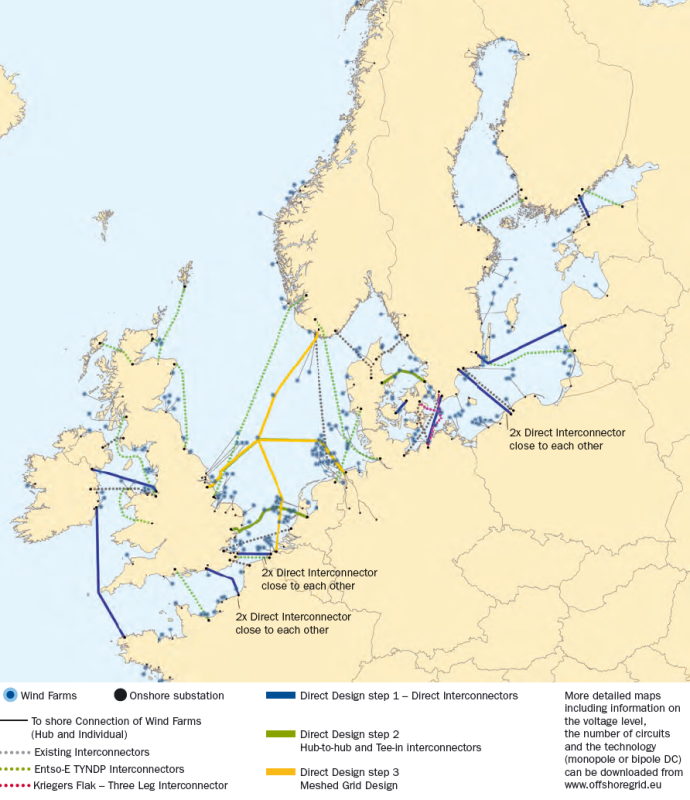 Both ABB and Seimens are busy with projects in the North Sea, an area that is similar to the east coast of the US in that both have wide undersea shelfs that are not very deep, and have excellent wind potential. The shallow nature (50-150 ft deep) makes excellent locations to anchor the bases for turbine towers. The UK, Norway, Denmark, Germany and France will eventually be interconnected, and able to share renewable energy, moving electricity from the wind farms in the North Sea long distances to where its needed.
Both ABB and Seimens are busy with projects in the North Sea, an area that is similar to the east coast of the US in that both have wide undersea shelfs that are not very deep, and have excellent wind potential. The shallow nature (50-150 ft deep) makes excellent locations to anchor the bases for turbine towers. The UK, Norway, Denmark, Germany and France will eventually be interconnected, and able to share renewable energy, moving electricity from the wind farms in the North Sea long distances to where its needed.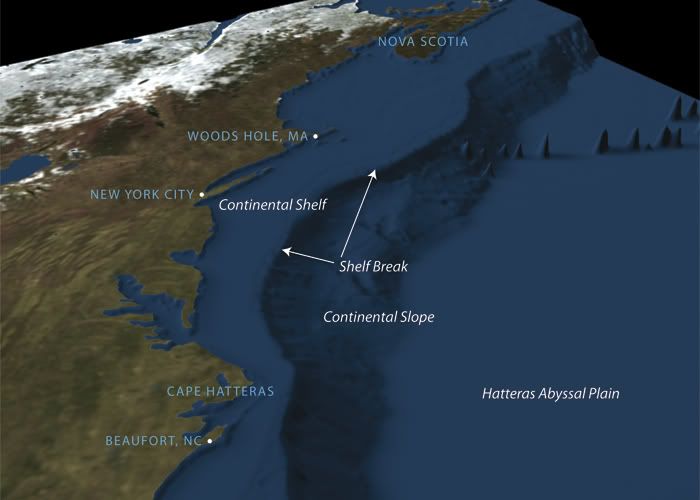
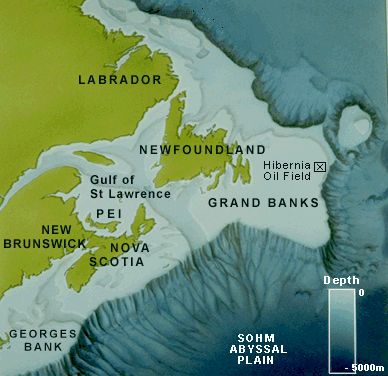
The east coast of North America, from Virginia north to Nova Scotia in Canada has a wide continental shelf with the potential of over 60 gigwatts of wind power generation.
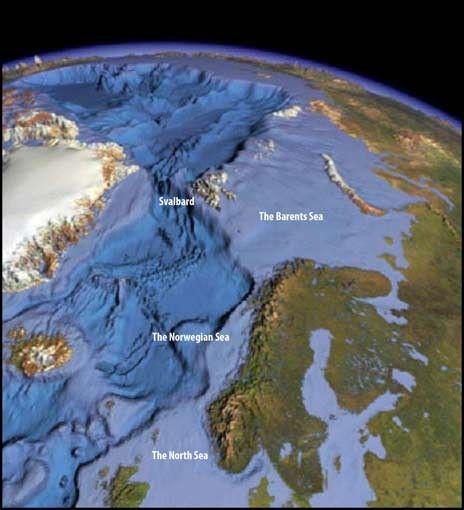
The North Sea, in the lower portion of this graphic also has a wide continental shelf. Here is a map from 1906 that may provide some more detail of the North Sea. The west coast of North America does not have a wide enough continental shelf to support large scale wind turbine development. ABB is also working on the 800 MW Dolwin1 which is scheduled for completion in 2013 and has completed the 400 MW Borwin1 in 2009. Siemens has also established itself as a major player in the North Sea with 4 projects, HelWin2 is scheduled to be completed in 2015, the 864 MW SylWin link to be completed in 2014, the 800 MW BorWin2 and the 576 MW HelWin1 links both scheduled for 2013. The HelWin2 platform will be erected by Heerema Fabrication Group in 75 feet of water.
Tino Vinkesteijn, Chief Commercial Officer Heerema Fabrication Group, says: “This award demonstrates the offshore wind industry’s confidence in our expertise and capabilities to successfully complete EPCI projects in the harsh North Sea environment. http://hfg.heerema.com/NewsMedia/NewsReleases/20120613HelWin2offshoreHVDCplatform/tabid/2036/language/en-GB/Default.aspxThe largest HVDC offshore project in the US that i have heard of is the Atlantic Wind Connection:
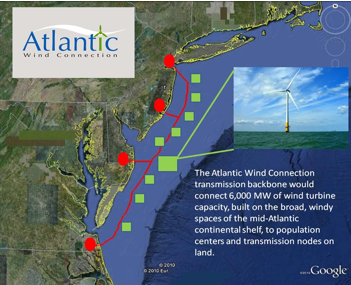
The Federal Government in the US has made it clear they support large thinking like the Atlantic Wind Connection, they do not want 20 or 30 separate wind developers building their own grid connections, this would require more environmental impact studies and require connections to the grid that are already robust and able to handle the load generated by the turbines. The AWC will only require 4 landfall points, only 4 environmental impact studies, and 4 grid tie in points, and yet capacity can be increased to 35 gigawatts with a Ultra High Voltage Direct Current cable. AWC expects to start construction on the north leg first, so Jersey will see some good paying wind power jobs hopefully in the coming year.
In fact, our clean wind energy is the cheapest electricity you can buy in some areas! http://www.citizenpower.com/GEC/
Following my revelation that George Osborne's Treasury is seeking to slash the subsidies for onshore wind power - the cheapest form of renewable energy - the House of commons select committee on energy and climate change is to investigate. http://www.guardian.co.uk/environment/damian-carrington-blog/2012/jun/14/wind-power-turbine-energy-subsidy?newsfeed=true
an LCOE presentation by Lawrence Berkeley National Laboratory (LBNL) researchers confirmed that wind is now at $33 to $65 per megawatt-hour and falling. http://www.greentechmedia.com/articles/read/how-low-can-the-price-of-wind-go/National Renewable Energy Laboratory's Eric Lanz noted, “if existing prototypes and recently commercialized equipment prove viable,” Lantz concluded, “cost reductions are likely to come sooner than we think.” Big money is starting to flow towards renewable projects, expanding Americas energy portfolio, and building the next generation of energy infrastructure. Capital is only just starting to recognize the lower price points of solar and wind. The AWC is slated to cost 5.5 billion dollars and provide jobs, good paying jobs, offshore work can pay 80k to 120 k per year. In the near term expect capital to move in more volume toward wind, and expect solar prices to catch up and pass wind power 5 to 10 years. The US Dept. of Energy has issued a white paper- 20% from wind in 20 years- and provide a very conservative estimate of job creation:
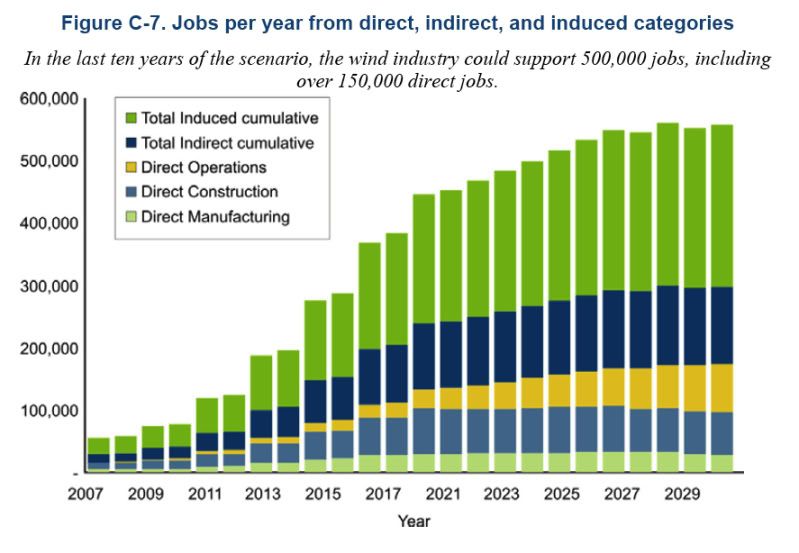
This estimate does not account for the multiplier effect, that the 500k+ jobs means people will spend their money on cars, homes, flat screens etc. With the first commercial scale Solar thermal storage systems being built (Arizona 500Mw) and the first existing wind powered pumped hydro plants (Spain 635 Mw), storage systems are now a reality. As Franklin Roosevelt said in his 4th fireside chat on October 22, 1933
If we cannot do this one way we will do it another. Do it, we will...... I have told you tonight the story of our steady but sure work in building our common recovery. In my promises to you both before and after March 4th, I made two things plain: First, that I pledged no miracles and, second, that I would do my best. I thank you for your patience and your faith. Our troubles will not be over tomorrow, but we are on our way and we are headed in the right direction.Tweet




